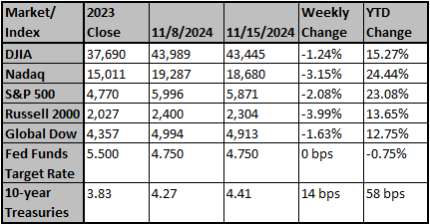This previous election has drawn historical comparisons to the election victory in 1980. Both elections underscored debates between approaches favoring government expansion and those prioritizing tax reforms and deregulation. Market reactions to both elections were positive, with the S&P 500 showing gains as confidence in the candidates’ policy proposals grew. Following the elections, markets appeared to respond favorably to policies emphasizing tax reductions and regulatory reform, while moving away from less popular proposals, such as taxing unrealized capital gains.
Despite this optimism, the aftermath of the 1980s election serves as a reminder of the complexities involved in economic adjustments. In the early 1980s, Federal Reserve Chair Paul Volcker implemented tight monetary policies to address inflation, leading to a recession. At the same time, tax reforms under Reagan’s administration required time to pass and take effect. Consequently, the S&P 500 saw declines in 1981 and early 1982 before entering a sustained period of growth.
While historical comparisons are useful, today’s economic environment differs in several ways. For instance, the Federal Reserve is currently reducing interest rates rather than raising them. Additionally, the Price-Earnings (P/E) ratio of the S&P 500 in October 1980 was 8.6, compared to 27 in October 2024, suggesting that market optimism may already be priced in.
The incoming administration has moved quickly to outline growth-focused policies and executive actions. Congress also appears motivated to act, though the legislative process remains inherently complex. Proposed tax changes, such as eliminating taxes on tips, Social Security, and overtime, offer targeted adjustments aimed at benefiting workers. However, these proposals differ from broader supply-side tax cuts designed to encourage entrepreneurship and innovation.
A significant element of the incoming administration’s agenda is the creation of the Department of Government Efficiency (DOGE), which aims to streamline regulatory processes and improve efficiency. Reducing bureaucratic hurdles could enhance productivity, while addressing the overall size of government spending may further influence long-term economic growth. Currently, government spending accounts for 23.4% of GDP, up from 19.1% in 2007, and this increase has raised questions about its impact on economic performance.
From 1990 to 2007, real GDP growth averaged 3% annually, but this has slowed to 2% per year since 2008. Despite significant advancements in technology and extended periods of low interest rates, growth has remained moderate. This has prompted ongoing debates about the role of government spending in economic performance. While some argue that public spending has a positive multiplier effect, others suggest that excessive spending can hinder private sector growth.
Efforts to reduce government spending could initially slow job growth, particularly in sectors influenced by public funding, such as healthcare and government employment. However, over time, these measures may foster greater economic activity and efficiency.
The current environment presents an opportunity to implement policies that could enhance long-term growth, improving living standards and market conditions. However, transitioning from expansive fiscal policies to a more sustainable approach is unlikely to deliver immediate results. Patience and a strategic focus on sustainable growth are essential. While short-term challenges may arise, the potential for long-term economic strength and global benefits remains significant.
Source: Brian S. Wesbury, Chief Economist, Robert Stein, Deputy Chief Economist First Trust
Chart reflects price changes, not total return. Because it does not include dividends or splits, it should not be used to benchmark performance of specific investments. Data provided by Refinitiv.
Sincerely,
Fortem Financial
(760) 206-8500
team@fortemfin.com
Latest News
Global shares edge lower; dollar, bond yields hold near multi-month highs
The U.S. dollar and bond yields held near multi-month peaks on Monday on expectations the Federal Reserve would slow its pace of easing, while global shares were mostly lower, with investors waiting for Nvidia's earnings release later in the week.
Reuters
US homebuilder confidence at 7-month high in November, survey says
U.S. homebuilder sentiment rose to a seven-month high in November and expectations for sales in the next six months surged to the highest in about two-and-a-half years after a Republican election sweep fueled optimism for regulatory changes that could lead to more residential construction, a survey said on Monday.
Reuters

